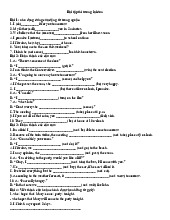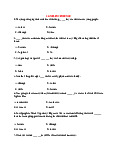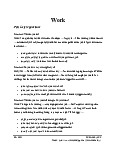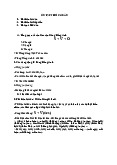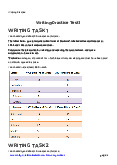


Preview text:
TEST 1: -S/-ES -D/-ED - CONDITION SENTENCES - LISTENING PRACTICE I.
Choose the word that underlined part is pronounced differently from the others 1. A. proofs B. books C. points D. days 2. A. helps B. laughs C. cooks D. finds 3. A. neighbors B. friends C. relatives D. photographs 4. A. snacks B. follows C. titles D. writers 5. A. tipped B. begged C. quarrelled D. carried 6. A. tried B. obeyed C. cleaned D. asked 7. A. packed B. added C. worked D. pronounced 8. A. watched B. phoned C. referred D. followed 9. A. agreed B. succeeded C. smiled D. loved 10. A. laughed B. washed C. helped D. weighed II. Choose the correct answer.
11. If the train is late, we ....................... to the office. A. walk B. will walk C. would walk D. walks
12. She .......................... if she has time. A. calls B. would call C. will call D. calling
13. I would tell you more about it if we .................................... more time. A. has B. will have C. have D. had
14. If I ......................... so busy yesterday, I would have visited you. A. were not B. wasn’t C. aren’t D. hadn’t been
15. I’ll do it if he ................................ me. A. asking B. will ask C. asked D. asks
16. I would have visited you before if there _____ quite a lot of people in your house. A. hadn't B. hadn't been C. wouldn't be D. wasn't
17. If you had caught the bus, you _____ late for work. A. wouldn't have been B. would have been C. wouldn’t be D. would be
18. If I _____, I would express my feelings. A. were asked B. would ask C. had been asked D. asked
19. If _____ as I told her, she would have succeeded. A. she has done B. she had done C. she does D. she did
20. Will you be angry if I _____ your pocket dictionary? A. stole B. have stolen C. were to steal D. steal III.
Viết lại các câu sau sang dạng câu điều kiện thích hợp.
21. We got lost because we didn’t have a map.
→ If we had had map, we wouldn’t have got lost.
22. I don’t know the answer, so I can’t tell you.
→ If I knew the answer, I could tell you
23. Peter is fat because he eats so many chips.
→ If Peter didn’t eat so many chips, he wouldn’t be fat
24. She doesn’t live in London because she doesn’t know anyone there
→ She’d live in London if she knew someone there.
25. I can’t live in the country because I can’t find a job there
→ I’d live in the country if I found a job there. IV.
Cho dạng đúng của động từ trong ngoặc
26. If we meet at 9:30, we (have) plenty of time. will have
27. Lisa would find the milk if she (look) in the fridge. looked
28.The zookeeper would have punished her with a fine if she (feed) the animals. had feed
29. If you spoke louder, your classmates (understand) you. could understand
30. Dan (arrive) safe if he drove slowly. would arrive
31. You (have) no trouble at school if you had done your homework. would have had no trouble
32. If you (swim) in this lake, you’ll shiver from cold. swim V. Listening.
33. Are the sentences true or false?
The Pomodoro Technique was invented in the 1980s.
Students and workers can use the technique.
The technique is a bit complicated to use.
You need to break down your tasks into smaller sections.
Each break is called a ‘pomodoro’.
Host: On ‘Star Students’ today we’re speaking to Peter who is going to tell us about the
Pomodoro Technique, a system to help manage your time. It was invented by an Italian man
called Francesco Cirillo in the 1980s. He called it the Pomodoro Technique after a tomato-
shaped timer that his mother used to use when she was cooking. Pomodoro is Italian for
tomato. And this tomato has helped Peter become an A-grade student. Welcome, Peter. Peter: Thanks.
Host: Tell us about the Pomodoro Technique. What’s it about?
Peter: It’s about getting maximum productivity from your available time. I use it for studying,
but professionals use it at work.
Host: Is it difficult to follow?
Peter: No. It’s actually very simple. It’s about breaking down your work into separate jobs and
then using a timer to separate your time into periods of intensive work and short breaks.
Host: OK, that sounds sensible. How do you start?
Peter: First of all, you should think about the task you need to complete. For example, writing
an essay for homework. You need to think about all the stages of the task and write a clear to-
do list on a piece of paper. When you are ready to start you set the timer to 25 minutes and you
start working on the first item on the list.
Host: OK … but what happens when the timer goes off?
Peter: When the timer goes off you must take a short break of between 3 to 5 minutes. One 25-
minute session is one ‘pomodoro’ so when you have completed this you deserve a short break.
You should try to move about a bit during the break.
Then set the timer for another 25 minutes and keep working. At the end of the next
‘pomodoro’ you have another short break. As you complete the items on the ‘to-do’ list you
should tick them off, to give you a feeling of satisfaction that you’re getting the job done.
Host: OK … I get it. Can you use any timer? Most people have timers on their phones these days, can you use that?
Peter: You could, but the danger is that then you check messages on your phone or you start
looking at apps. I use my dad’s kitchen timer and I make sure I switch off my phone when I’m
studying. I get so much more done. In the breaks I sometimes check my phone but only if I’ve
completed some of the items on my to-do list.
Host: Three to five minutes isn’t long for a break. Is that enough time?
Peter: Well, when you’ve had four or five short breaks you can take a longer break, then you start again. Host: And it works?
Peter: Yes! It works for me. It stops me wasting time. My work is much more effective when I
use the timer. It’s like short, intense periods of work. I actually get my homework done a lot
quicker now which leaves me more free time, so for me it works really well.
Host: I think I’ll give it a try. Thanks for coming in, Peter.
Peter: You’re welcome. Thanks for inviting me.
34. You will hear three short conversations. There is one question for each
conversation. For each of the questions, circle the right answer (A, B, C, or D).
You will listen to the recording twice.
- What is the daughter wearing? A. A skinny T-shirt. B. A tight dress. C. A short top. D. Casual jeans.
- What does the boy think about single-sex schools? A. They're boring.
B. They limit academic performance. C. They're full of joy. D. They're life-changing.
- Which is NOT correct about Tom Butler? A. He’s excellent at Maths.
B. He wants to join a sport team. C. He plays a sport well. D. He won a medal in soccer.
